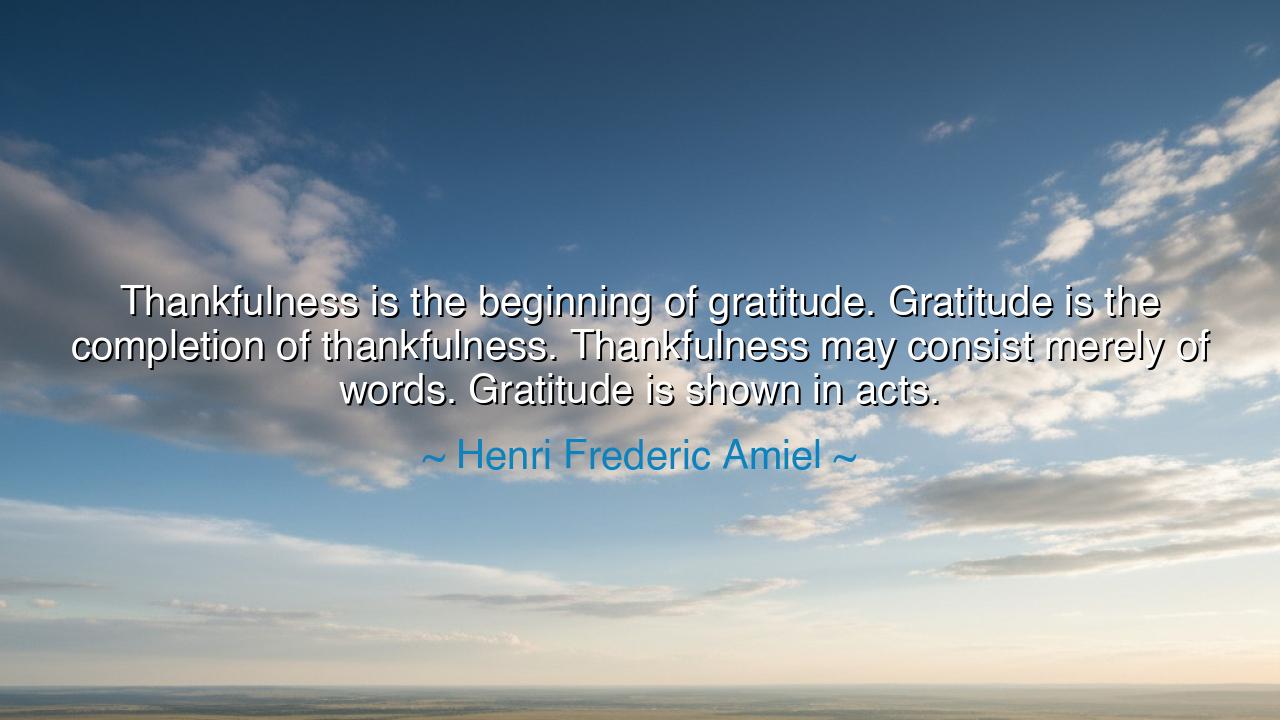
Thankfulness is the beginning of gratitude. Gratitude is the
Thankfulness is the beginning of gratitude. Gratitude is the completion of thankfulness. Thankfulness may consist merely of words. Gratitude is shown in acts.






Henri Frederic Amiel, the philosopher of Geneva, gave us this piercing distinction between word and deed, surface and depth: “Thankfulness is the beginning of gratitude. Gratitude is the completion of thankfulness. Thankfulness may consist merely of words. Gratitude is shown in acts.” In these words, he draws a golden line between what is spoken and what is lived. Thankfulness is the seed; gratitude is the fruit. One may say “thank you” with the lips, but until the life itself responds with action, the soul has not yet reached the fullness of its thanksgiving.
To Amiel, thankfulness is not without value, for it begins the journey. Words of thanks are like the first rays of dawn, signaling that the heart has perceived a blessing. But dawn is not the day, and the rising sun must move to its fullness. In the same way, spoken thanks must blossom into lived gratitude—into choices, deeds, and sacrifices that embody the appreciation one feels. Without action, words risk becoming hollow; with action, they become truth.
This wisdom is echoed in the ancient teachings. The Scriptures speak of faith without works as dead; so too is thankfulness without action an empty echo. Cicero, too, declared that gratitude is the mother of all virtues, for it transforms sentiment into character. The ancients knew that words are fleeting, but deeds endure. Amiel takes this ancient insight and carves it anew, showing that thankfulness is but the first step on a long road that culminates in the nobility of gratitude lived out.
History gives us shining examples of this. Consider the life of Florence Nightingale. Many in her time expressed words of thankfulness for the suffering soldiers of war, yet it was she who turned that sentiment into gratitude in action. She left the comfort of her station and walked into the blood-soaked wards, bringing light, care, and healing. Her acts were gratitude embodied—gratitude for life, gratitude for duty, gratitude for the call to serve. Through her, Amiel’s distinction shines clear: words may begin, but deeds complete.
Even in smaller stories we see this. The child who says “thank you” for bread may speak politeness; but the grown man who, remembering that bread, later feeds the hungry, shows true gratitude. One is word, the other is act. One begins the circle, the other completes it. The noblest souls are those who do not stop at speech, but allow their thankfulness to ripen into generous action that blesses others.
The lesson for us is powerful: do not be content with polite words alone. Speak your thanks, yes, for silence breeds forgetfulness. But go further—translate words into deeds. Let gratitude shape how you live, how you treat others, how you spend your time and resources. For it is not what we say, but what we do, that reveals the true depth of our thanksgiving.
Practically, this means asking each day: how shall I embody my gratitude? If thankful for health, let it be shown in caring for the body and aiding the sick. If thankful for freedom, let it be shown in defending the oppressed. If thankful for love, let it be shown in sacrifice and loyalty. In this way, thankfulness ripens into gratitude, and gratitude becomes not merely a word but a way of life.
Thus, Amiel’s words endure across the centuries: thankfulness is the beginning, but gratitude is the completion. The lips may speak, but the hands and heart must act. Let us, then, be not only thankful in speech, but grateful in deed, so that our lives themselves become the living hymn of thanksgiving.






AAdministratorAdministrator
Welcome, honored guests. Please leave a comment, we will respond soon